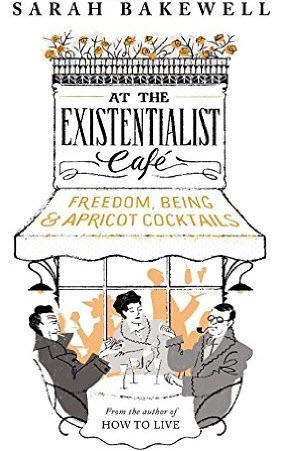I was reading Sarah Blakewell’s At The Existentialist Cafe on the weekend.
 It’s an engaging window on the key proponents of modern existentialism; Jean-Paul Sartre, Simone de Beauvoir, Albert Camus, Marting Heidegger… and others. Blakewell’s book weaves biography and thought, and “takes us to the heart of a philosophy about life that also changed lives, and that tackled the biggest question of all: ‘what we are’ and ‘how we are to live’.”
It’s an engaging window on the key proponents of modern existentialism; Jean-Paul Sartre, Simone de Beauvoir, Albert Camus, Marting Heidegger… and others. Blakewell’s book weaves biography and thought, and “takes us to the heart of a philosophy about life that also changed lives, and that tackled the biggest question of all: ‘what we are’ and ‘how we are to live’.”
Since my twenties, I’ve been sympathetic, and often sensed my own life, through existentialist eyes.
Blakewell’s book got me wondering about my work as a mediator; as someone who bridges differences, of people in conflict, and other contexts, too. To what extent is a mediator’s work in line with existentialism?
What is existentialism?
Blakewell offers a succinct account (no easy feat) of what existentialist’s do:
– Existentialists concern themselves with individual, concrete human existence.
– They consider human existence different from the kind of being other things have. Other entities are what they are, but as a human I am whatever I choose to make of myself at every moment. I am free –
– and therefore I’m responsible for everything I do, a dizzying fact which causes
– an anxiety inseparable from human existence itself
– On the other hand, I am only free within situation, which can include factors in my own biology and psychology as well as physical, historical and social variables of the world into which I have been thrown.
– Despite the limitations, I always want more: I am passionately involved in personal projects of all kinds.
– Human existence is thus ambiguous: at once boxed in by borders and yet transcendent and exhilarating.
– An existentialist who is also phenomenolgi8cal provides no easy rules for dealing with this conditions, but instead concentrate son describing lived experience as it presents itself.
– By describing experience well, he or she hopes to understand this existence and awaken us to ways of living more authentic lives.
The Existentialist Mediator
When I reflect on times where things were flowing well for me, in the mediator role, I can see myself aligned with an existentialist mindset. Maybe that’s a stretch? I don’t know.
The existentialist mediator helps individuals in conflict:
- describe and articulate their situations, stories, feelings…
- take responsibility for their choices, their own actions and behaviours, constructive and/or destructive (conflict escalates or deescalates depending on one’s personal response to triggers and events)
- normalize their feelings; e.g., “that is how most people feel when that happens… that does not make you a bad person”
- recognize the human paradox: that no matter how much we control, our choices, there are still things out there, beyond our control (“the big one”); what’s important is context, the situation we find ourselves in, and dealing with that situation as best as one can (e.g., in ‘unconditionally constructive’ ways, as per Fisher & Ury’s Getting to Yes)
- see conflict as a learning opportunity; as part of a lifelong journey, to learn more about oneself, and to reach out, beyond oneself, to others; to be part of a much bigger picture… (note: existentialism and religion are not mutually exclusive)
What else would you add?
Existentialism, today
Existentialism’s heyday was the decades following WWII. While it dropped a bit from the public eye, in the late 20th century, it remains influential, and relevant.
As an advocate for proactive conflict management, I’ve always felt the sooner we take ownership of our choices, and attendant actions and effects, the better off we are, both individually, and collectively, as communities and nations. Taking responsibility is step 1, and a vital part of any restorative action.
Taking responsibility for our choices – the heart and soul of existentialism.

Speak Your Mind